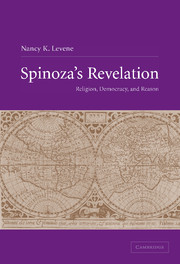Book contents
- Frontmatter
- Contents
- Preface
- Acknowledgments
- List of abbreviations
- Introduction
- 1 Vera religio
- 2 Spinoza's Bible: Concerning how it is that “Scripture, insofar as it contains the word of God, has come down to us uncorrupted”
- 3 Politics, law, and the multitude
- 4 Reason, revelation, and the case of the Hebrews
- Conclusion
- Bibliography
- Index
Conclusion
Published online by Cambridge University Press: 22 September 2009
- Frontmatter
- Contents
- Preface
- Acknowledgments
- List of abbreviations
- Introduction
- 1 Vera religio
- 2 Spinoza's Bible: Concerning how it is that “Scripture, insofar as it contains the word of God, has come down to us uncorrupted”
- 3 Politics, law, and the multitude
- 4 Reason, revelation, and the case of the Hebrews
- Conclusion
- Bibliography
- Index
Summary
Spinoza has always been hard to place in the history of philosophy, religion, and politics. Unlike many of Spinoza's medieval precursors, for whom reason and revelation were hierarchically related, and unlike many of his contemporaries, for whom reason and revelation agreed in all important respects except for the supernatural claims of the latter (to which reason gives informed but deferential assent), Spinoza attempted to put this perennial question on a footing which leaves both sovereign. In so doing, he developed a way of thinking not simply about the relationship (epistemological and ontological) between God and human beings, but about the relationship between thinking, interpretation, and political life whose conceptual riches were in many respects misunderstood or misplaced by later thinkers.
This book has shown that the difficulty of placing Spinoza – and the tendency to see his authorship divided against itself – has its source at the very heart of his project. For Spinoza's critique is, above all, a double-edged one. His critique of religion is also a defense of religion; his critique of reason is also a defense of reason; his critique of law is also a defense of law. What Spinoza critiques above all is the attempt to attain salvation or blessedness, whether philosophical, theological, or political – the attempt to attain libertas – by escaping the struggle, labor, work of transforming bondage, slowly and with great effort, into freedom.
- Type
- Chapter
- Information
- Spinoza's RevelationReligion, Democracy, and Reason, pp. 234 - 241Publisher: Cambridge University PressPrint publication year: 2004



